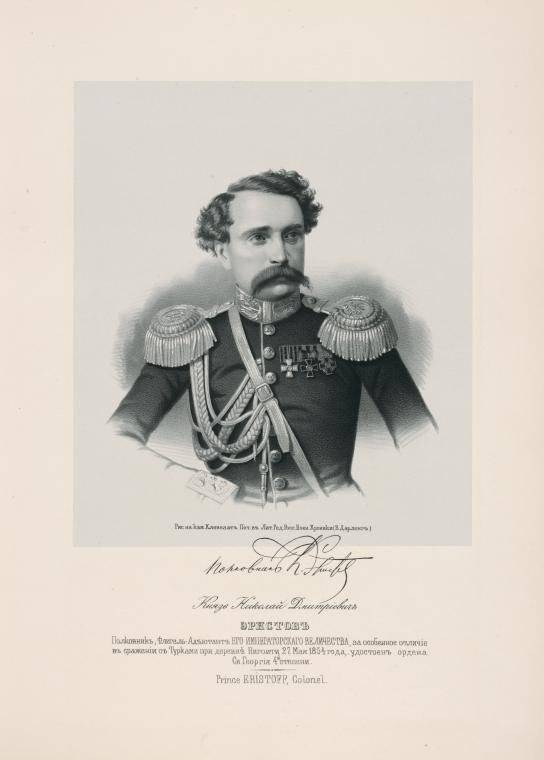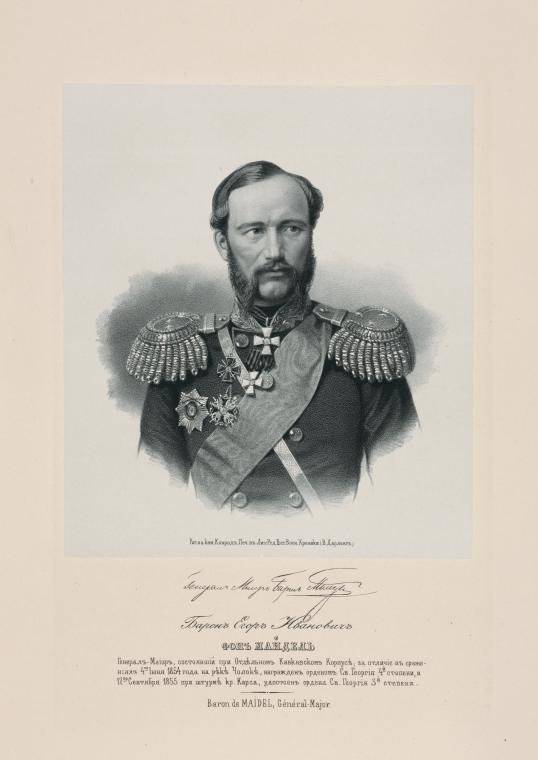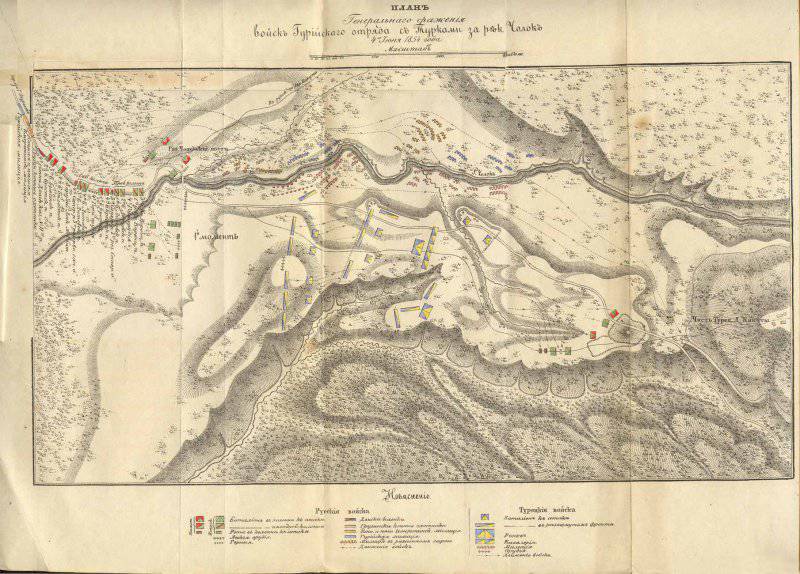Beginning of the 1854 Caucasus Campaign of the Year: Victories at Nigoeti and Cholok
Vorontsov pointed out that Russian troops could seize Batum, return the post of St. Nicholas, but in order to hold them they would have to allocate special garrisons, which would lead to even greater dispersal of forces and vain losses. Prince Varshavsky, from whom Nikolai asked for advice, confirmed the words of the Caucasian governor. The offensive of the Russian army was postponed until the spring-summer of 1854.
In addition, Vorontsov rightly noted that the appearance of the Anglo-French in the Black Sea fleet sharply worsened the situation on the coast. It was not possible to keep the weak coastal fortifications, not connected with each other and not having powerful coastal artillery. According to the report of the head of the Black Sea coastline, Vice Admiral Serebryakov, our fortifications could not withstand the attacks of even the Turks alone, and besides, they did not have a supply of provisions to withstand the siege. This forced the Russian command to clear all the fortifications on the eastern shore of the Black Sea, except for Anapa, Novorossiysk, Gelendzhik and Sukhum-Kale. The enemy, occupying these points, received good bays, parking for the fleet near the Crimea. And Sukhum gave the enemy a raid that could not only be used for wintering the fleet, but to create an operational base for the invasion from Abkhazia to Mingrelia.
Other garrisons removed. For this mission, three ships under the flag of Rear Admiral Panfilov were sent from Sevastopol to the shores of the Transcaucasus, who, together with the ships of the Sukhumi squadron, removed the garrisons, most of the artillery and ammunition. 5 (17) of March in Novorossiysk landed more than 8,8 thousand people.
The 1853-1854 winter in the Caucasus was rather severe. In the Alexandropol direction, the 4 and 19 Cossack regiments carried the guard service. They were not limited to border security and made raids into the Turkish lands, crossed the attacks of bashi-bazouks and Kurds. It should be noted that if the Turks and bashi-bazouks took food and forage for free from local residents or gave receipts, the Russians paid in cash. Therefore, residents of the Turkish Karsky pashalyk willingly delivered everything they needed to Alexandropol, which made it easier for the Russian command to organize hospitals and stores (warehouses). When deep snow fell all the fighting was stopped until spring.
In winter, the Caucasian Hotel Corps was reinforced with significant reinforcements: the 18 Infantry Division arrived, and so far two dragoons — No. 4, Prince of Warsaw (Novorossiysk) and No. 18, Grand Duke Nikolai Nikolaevich (Tver).
Prince Vorontsov, after numerous requests, received his resignation (at first this was a long vacation). This elderly and very sick man, who has done so much for the empire, deserved rest. Vorontsov was replaced by General Nikolai Andreevich Read. This commander was notable for his brilliant bravery and was awarded, for distinguishing the Patriotic War of 1812 and the foreign campaigns of the Russian army 1813-1814, with orders of St. Vladimir 4 degree, over. George 4 degree and a golden saber with the inscription "for courage." In 1831, Read took an active part in suppressing the Polish uprising. Consisting at Field Marshal Prince Paskevich, he served as an inspector of cavalry of the army, and then, arriving in the Caucasus in 1852, was at the corps headquarters. 2 March 1854, the year Read joined command of the Caucasian Corps.
The main forces, the Alexandropol Corps, were still commanded by Bebutov. In addition, in order to have a replacement in case of illness or the death of a prince, Alexander Ivanovich Baryatinsky was appointed to support him at the suggestion of Vorontsov. Prince Baryatinsky spent most of his working time in the Caucasus. He was awarded the Order of St.. George 4 degree. He commanded the 3 battalion of the Kabardian Eger regiment, the Kabardian regiment, the Caucasian Reserve Grenadier Brigade, the 20 Infantry Division. Served as head of the left flank of the Caucasian line. Baryatinsky became famous in a number of cases against the highlanders. The prince made several very successful expeditions to Great Chechnya, strengthened the Sunzhensky line, destroyed a number of robber dens. This has gained great influence among ordinary Chechens, who, having become convinced of the strength of the Russian weapons, began to move under the protection of Russian fortifications and formed a numerous and courageous militia, which contributed to the struggle of the Russian army against the still resisting mountaineers. During the war with Turkey, he was chief of the main headquarters of the troops in the Caucasus, replacing Bebutov during his illness.
The forces of the parties
Turks all winter 1853-1854 with the help of British and French advisers, they reorganized the army. Although the Crimean Peninsula was to become the main theater of military operations, the Ottoman command did not abandon its conquering plans for the Caucasus. The number of Anatolian army was brought to 120 thousand bayonets and sabers. Her new commander was Zarif-Mustafa Pasha. He was an experienced military commander who was known as a harsh and cruel man. The chief of staff was the French General Guyon. Istanbul has not abandoned the previous offensive plan. The Anatolian army was to break through to Tiflis and further to the North Caucasus.
To capture the capital of the Caucasian governorship, the shock 50-thousand was allocated. Batumi Corps under the command of Magomed Selim Pasha. This corps was the main striking force of the Anatolian army and intensified until the start of hostilities. The strike was planned to be delivered through Guria. From the sea, the Turkish army was supposed to support the fleet, which now dominated the Black Sea. The Russian sailing fleet was blocked in Sevastopol Bay, the steam Anglo-French fleet dominated the sea. In addition, 60-th. the corps was located in the Kars region. Another strong Turkish detachment was located in Bayazet.
Russian forces were divided into several groups. The Alexandropol detachment under the command of Prince Bebutov was reinforced by the Jäger Brigade of the 18 Infantry Division, with three pedestrian batteries, two battalions of the Ryazhsky Regiment with a light battery, a consolidated dragoon brigade with the Don battery No. 6, and a Line Cossacks 15 battalion, and a Line Cossacks 19 battalion, Line Cossacks 26, and the Line Cossacks, Xerox, and I, I, I, I have to go to I, I will have a IO, I, I, I, I will use the IO, I will use the IOL to change the line to I can, I will have I I want to I to change it, I will I I I I need to I, I can I I I am I, I, 5; As a result, detachment forces increased to 3 battalions, 12 squadrons, 74 Cossack regiments, 20 hundreds of militias with 12 guns. Total 7,5 thousand people (XNUMX thousand infantry and XNUMX thousand regular and irregular cavalry).
The Turkish Batumi Corps was opposed by two detachments under the general command of Major General Andronikov. Major General Prince Gagarin commanded the Guri detachment. The squad included 10 and a half infantry battalions, 2 Cossack hundreds, 12 guns and 34 and a half (about 4 thousand) hundreds of Caucasian irregular troops (police). At the head of the Akhaltsykh detachment was Major General Kovalevsky. It consisted of: 8 infantry battalions, 9 Cossack hundreds, 29 hundreds (about 3,5 thousand people) of the police with 12 guns. In addition, in reserve, in Borzhom and Suram, stood on the 2 battalion. The Erivan direction was guarded by a detachment under the command of Lieutenant General Baron Karl Wrangel. It consisted of 4 and a half infantry battalions, the Don Cossack and equestrian Muslim regiments, 12 guns.
The general reserve was located in Tiflis: the 4 battalion of the Ryazan Infantry Regiment, one battalion of the Navaginsky Regiment (it was used for guard duty). The rest of the troops were part of Dagestan, part of the Lezgin line.
The beginning of the fighting. Victory at Nigoeti
The Anatolian army delivered the first blow to the right flank of the Russian front. Already in the winter, Guria and Mingrelia were constantly disturbed by raids from Kobuleti Sanjak (Okrug), or by landings from the sea. In late May - early June, 12-th. the avant-garde of the Batumi Corps under the command of Hasan-Bey (Gassan-Bey), who was originally from the Kobuleti princes and undertook to show the way through the village of Nigoeti to Kutaisi, went on the offensive.
At that time, there were only 10 incomplete companies and 10 hundreds of Gurian militia near the village of Nigoet, with 4 guns under the command of Lieutenant Colonel Prince Nikolai Dmitrievich Eristov. Prince Nicholas did not wait for the enemy to appear and moved towards the enemy. 8 Jun two squad met. Eristov took advantage of the fact that the enemy had dispersed his forces, left a small reserve behind him, and with the main forces swiftly struck the center of the Ottoman army. Russian and Guri warriors overturned the Turkish center with a quick blow, seized 2 guns, and then turned against the enemy flanks, which already surrounded our reserve and artillery. The Ottomans, unable to withstand the friendly onslaught and bayonet attacks, fled.
The fight was fierce. The Turks lost up to 2 thousand people killed and wounded, 2 guns and the entire train. Russian trophies were the newest French guns - a gift to the Sultan from France. The head of the Turkish detachment Hasan Pasha himself was killed. Russian squad lost around 600 people. The 1 Battalion of the Kura Regiment especially distinguished itself in this battle. As a reward for this feat, the prince of Eristov was promoted to colonel, appointed adjutant and granted the Order of Saint. George 4 degree. George's Order of the 4 degree was also awarded to Major Mombelli of the Kura Regiment, who overturned the cover of the enemy battery with a bayonet attack and captured the 2 gun. As well as the captain of the 13 artillery brigade Gulevich, who 6 once repelled enemy attacks and was seriously wounded.

Prince, Russian general, hero of the Crimean War Nikolai Dmitrievich Eristov (Eristavi) (1821 — 1856)
Battle of Cholok
After receiving the news of the movement of the enemy troops and the victory at Nigoeti, Prince Andronikov made the main forces of his detachment 10 June from Marani to Ozurgety. The Russian squadron consisted of 10 thousand soldiers with 18 guns. Andronikov planned to prevent the Batumi enemy corps from concentrating all its forces and leaving the mountains to the operational space, to the plain. The advanced Turkish forces, not daring to give battle in Ozurgety, abandoned the fortress with large stocks of food and warehouses with British goods. The Ottomans fled over the river Cholok.
15 June Andronikov occupied Ozurgets. 16 June Russian squad continued movement. 34-thousand Turkish corps with 13 guns under the command of Selim Pasha prepared for the battle. The front was reinforced by field fortifications, the right flank was defended by a steep, almost impregnable ravine, the left flank was covered by a dense forest. The only weakness of the Turkish corps was the lack of artillery: Ottoman 13 guns against the Russian 18.
The military council of the detachment spoke in favor of storming enemy positions. Andronikov decided to deliver the main blow to the enemy’s left flank. The sentinel detachment of Prince Mikeladze’s Gurians overturned Turkish pickets. Russian troops crossed the river Cholok in two columns. The right column under the command of Meidel consisted of two battalions of the Kura and two Lithuanian regiments. The left column, commanded by Major General Brunner, consisted of two Brest battalions and two Lithuanian regiments. Each column had 4 mountain guns and one sapper company each. For the column Brunner followed 8 light guns. The reserve was a battalion of Belostok and two battalions of the Brest regiment with 2 mountain guns under the command of Colonel Karganov. The infantry was followed by cavalry.
The pedestrian militia unit was scattered in front of the columns, and partly sent to the right flank of the enemy to divert his attention. A part of the Gurian and Imeretian militia started a hot gunfight on the right flank with the Turks, creating the impression of preparing an attack through the ravine. This alerted Selim Pasha and his European advisers.
Battle plan on the river Cholok. Source: M.I. Bogdanovich. Eastern War 1853-1856's
The column of Midedel turned against the left flank of the Turkish corps. In the first line, the battalions of the Kura regiment with 4 guns were located, in the second - the battalions of the Lithuanian regiment and the engineer company. Against the right flank of the Turkish troops turned column Brunner. Part of the Brunner column was supposed to facilitate the attack of the troops of Midedel. A light battery and 4 mountain guns under the command of Colonel Mamatsev were pushed into the center of battle formation and opened fire on the enemy.
The Russian batteries moved forward along with the infantry, onto a shotgun shot, and opened fire on the enemy. The battalions of the Kura regiment were hit with bayonets. They overturned the Turkish troops and broke into the camp. During the battle under General Maidel killed a horse. Selim Pasha, trying to correct the situation, threw all his reserves into battle. The Russian infantry was greeted with shot fire and battalion salvoes of infantry. Kurintsy suffered significant losses and were forced to move somewhat.
At this critical moment Prince Andronikov launched a general offensive. The battalions of the Brest, Belostok and Lithuanian regiments rushed to the aid of the Kura chasseurs, the Russian infantry with a drumbeat struck with bayonets. The cavalry struck on the left flank of the enemy. Cossacks from two sides attacked the enemy camp. Their commander, Colonel Kharitonov, died in a fierce battle. However, the Cossacks crushed the enemy. Georgian cavalry squad, beating around the rear of the blockages, overturned one of the Turkish battalions, seizing the enemy banner. The fight was fierce. Several officers who were ahead of the squad died or were injured. The squad commander, Lieutenant Colonel Prince Jandierov, and his assistant captain Prince Tsitsianov were injured.
The Imeretinskaya Horse Militia also bravely attacked the enemy and lost its commander, Prince Koyhosro-Mikeladze, in battle. Gurian foot militia repulsed a mountain weapon from the enemy. The Ottomans stubbornly defended in the rubble, tried to cling to two small rear camps, also fortified, like the main camp, but were knocked out and ran from there. General Brunner with a part of the squad drove the enemy until the Turkish corps finally dispersed. Mounted police pursued the enemy about another 2 hours.
A large role in this victory was played by Russian artillery. The Russian batteries covered the Turkish cavalry, which prepared for the counteroffensive, mixing and disrupting its ranks. Then Russian gunners struck the field fortifications of the Turkish corps. The Ottoman infantry was confused, stunned by such a strong raid. Russian batteries suppressed Ottoman artillery. The Turks quickly lost an artillery duel.
It was a complete victory. The Turkish corps lost 3-4 thousand people killed and wounded, all artillery with charging boxes, 36 banners and badges, three marching camps with all the supplies, pack transport from 500 mules. The treasury of Magomed-Selim Pasha was also captured, which was estimated at 0,5 million rubles. Almost the entire Turkish corps fled. Selim Pasha fled with few bodyguards. The Anatolian army lost its main striking force, which was to decide the outcome of the 1854 campaign of the year. As a result, the entire region, entrusted to Prince Andronikov, was safe. Russian squad lost to 1,5 thousand people.
For victory at Choloka, Prince Andronikov was awarded the Order of St. Alexander Nevsky. Major General Maydel, Colonel Mamatsev, Lieutenant Colonels Brevern and Dzhandierov, Major Makryz, Captain Talvinsky, Captain Dudnichenko and Second Lieutenant Bykovsky were awarded orders of St.. George 4 degree.

Russian general, hero of the Caucasian and Crimean Wars Egor Ivanovich (Georg-Benedict-Heinrich) Meidel (1817 — 1881)

Information